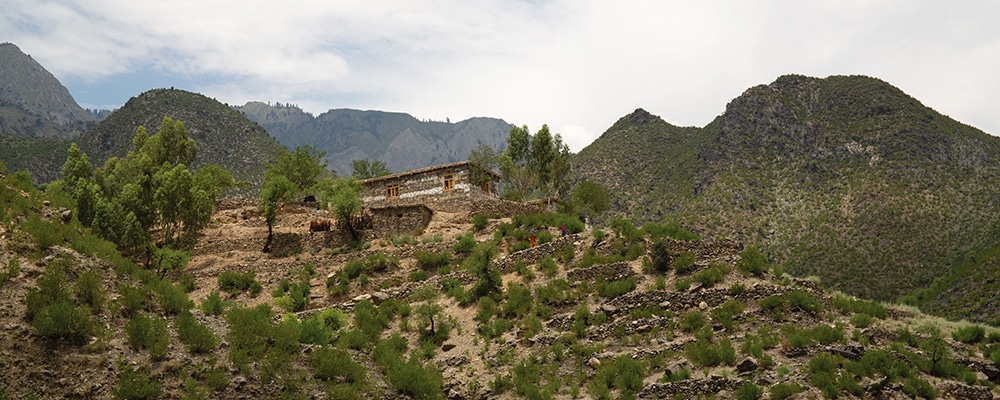Using education to change a life, a community, and an entire nation
By Rebecca Lee
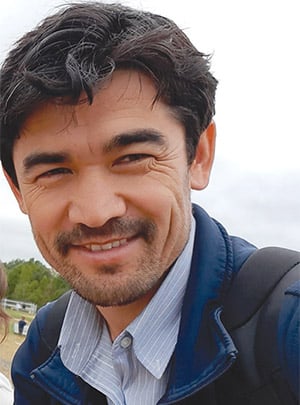
CAI Program Officer Zia Sanaban’s journey from a poor, remote village in Afghanistan to a prosperous life in Maryland is a story of hardship and struggle, perseverance and courage.
Zia Sanaban grew up with three brothers in a poor rural village in Afghanistan. His family and neighbors never had enough money and were constantly struggling to make ends meet. They had no electricity and no access to essential services. Jobs were scarce. Government aid and support systems to help impoverished families like his did not exist.
Children were born poor and stayed poor, unless they had the opportunity to go to school. “As a boy growing up, I believed education would help me overcome some of the challenges my family was facing,” said Zia. “Education would mean I could also help my community. Even when I was young, I knew I wanted to give something back to my community. I knew I wanted to help people.”
Zia dreamt of becoming a scientist or engineer so he could help tackle some of the most pressing challenges of his community. “We had no electricity. There were transportation problems and health issues. We had to walk long distances to school. There was no access to the internet or other resources,” he explained. “For me, education was something that could help me overcome some of these issues personally, for my family, and, on a broader scale, for my community.”
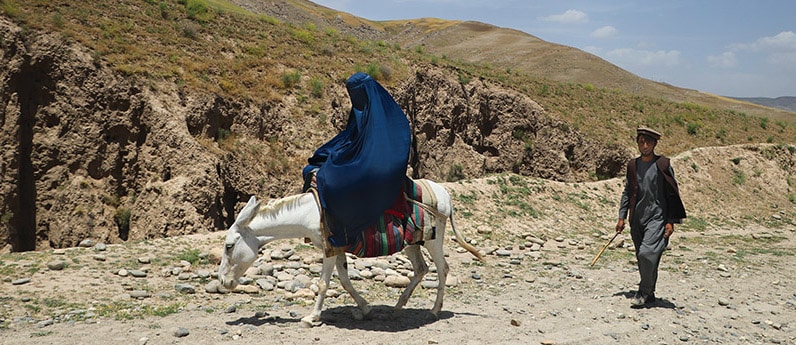
Learning the value of education from his parents
Zia’s mother was a strong woman who refused to accept the traditional way of life for herself and her children. She knew education was essential if her boys were to escape a life of poverty. She revered her brother and uncle—both teachers—and told her boys that these men inspired her. Her esteem and respect for teachers made an impression on Zia, one he never forgot.
Both of his parents were hard workers, but it was difficult for them to make enough money to afford school. They had to make many sacrifices to cover the fees, supplies, and uniforms their four boys required to attend classes. “My parents were kind enough to tackle all the socioeconomic challenges to help us go to school. It took their blood, sweat, and tears to make sure we were getting an education.”
To earn income, they farmed for other people and used the money to cover school expenses. Zia and his brothers rewarded their parents’ hard work by excelling at school. They also helped other students with their homework.
“Getting an education is the first step for families to be able to tackle the challenges and contribute to the development of their community,” explained Zia. “Becoming a doctor means your community will have a doctor and lower mortality rates.
Becoming a teacher means one day you can help the children of your community become educated. By getting an education, you will change the lives of your family and your village.”
The challenges that Zia’s parents faced are not unique in the rural villages of Afghanistan, Pakistan, and Tajikistan. Poor families across Central Asia encounter the same hurdles: weak or nonexistent infrastructure, scarcity of jobs, no health care, and few educational opportunities. Uneducated and without resources, the children of these villages are trapped, unless they go to school. Education is their one hope for a more meaningful, independent life.
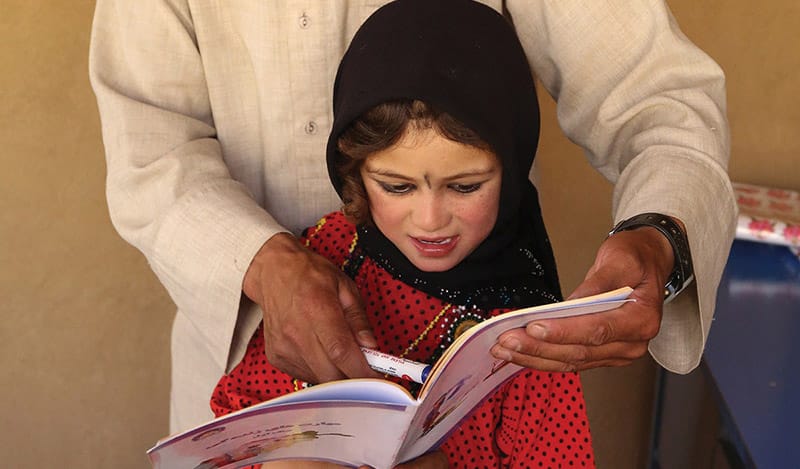
Using education to become a change agent
With uncles who were teachers and a mother who put teachers on a pedestal, perhaps it was inevitable that Zia would become a teacher. He was a good student, excelling in math and the sciences, and his teachers liked him. When he was in high school, they recruited him to help teach middle school.
“This was a dream job for me—to teach and help people,” said Zia. “I learned how to deal with students, how to cover difficult topics. I was a part-time teacher. In the morning, I went to school. In the afternoon, I went to the girls’ school to teach. I learned a lot during that time. I learned how an individual can contribute by helping their peers and the children of their community.”
Zia went on to graduate from college in Kabul. He earned a master’s degree as a Fulbright scholar at Ohio University in Athens, Ohio, then returned to Afghanistan and worked for nine years in program management and career development. Back in Afghanistan, Zia was an active participant in his country’s Fulbright community.
“We were trying to make an impact,” he recalled. “We thought of ourselves as change agents to help Afghan society become a better society. We wanted to overcome socioeconomic challenges, let daughters go to school, and allow women to work.”
Even under Taliban control, Afghans demand access to school
When the Taliban returned to power in August 2021, it imposed severe restrictions on all aspects of society, particularly on women and girls. This included limiting girls’ access to school. Despite these obstacles, CAI was able to give more than 5,700 children, mostly girls, the opportunity to go to a community-based school this past year. With the support of its donors, CAI hopes to increase that number to at least 7,500 this coming school year.
Courageous people in remote Afghan villages are ignoring the Taliban’s decrees against education and demanding their children be educated. Mothers and fathers are standing up for their daughters, insisting they go to school. They’re working to find safe spaces to house community-based schools and serving on the local councils that monitor the schools. Villagers are working with NGOs to convince government authorities that their village needs a school. Like Zia’s parents, these Afghans are passionate about their children becoming literate and having the chance to build a better life.
Unfortunately, many of the people who could have helped fight for this cause were forced to leave the country when the Taliban seized control. Thousands of educated, forward-thinking Afghans—journalists, government workers, academics, and political activists—knew they would be targeted and face persecution by the new government, so chose to flee if they could. Zia was one of those people. He and his family made it out of Kabul on August 28, 2021.
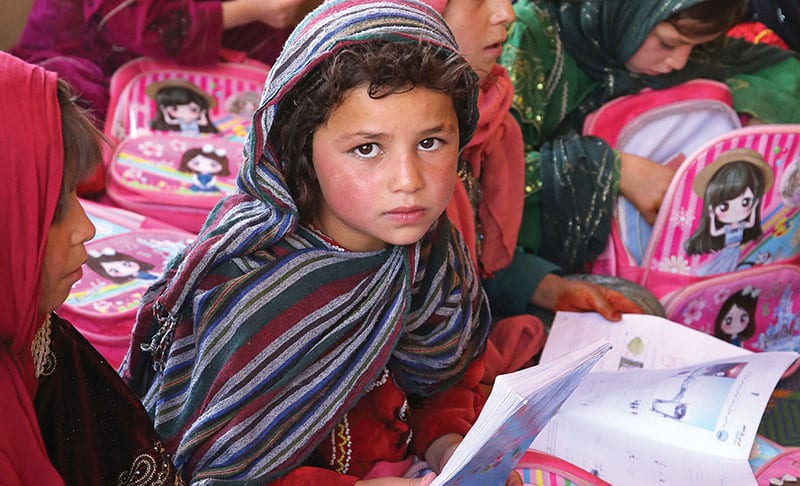
A new life in America, but never forgetting the people of Afghanistan
Zia’s wife was pregnant when they left Afghanistan, so their fourth daughter was born in the United States. Zia is grateful that his family is in a safe place. His daughters love school. His wife is learning English. And Zia, as program officer at CAI, is working tirelessly on behalf of the children, especially the girls, still in Afghanistan. He understands the desperation of poverty. He witnessed the sacrifices his parents made to send him to school. And he’s living proof of what can happen to a child who’s given the opportunity for an education.
In his position at CAI, Zia helps make education possible in impoverished communities that are largely overlooked by the rest of the world. “In Afghanistan, Pakistan, and Tajikistan, there are a lot of out-of-school children,” he said. “The quality of education is below standard. Access to education, job opportunities, and the outlook for careers for girls and women are all challenges. My work now directly contributes to those people by helping them get an education, pursue their dreams, and have a decent life.”
Zia is thrilled that his daughters are adapting to life in America and reaping the benefits of living in a free, open society. He recalled that in Afghanistan, it was difficult for them to even go outside. “We had a boundary wall around our house. The kids could only play inside the wall,” he said. “There were kidnappings and killings, extortion, and other things. We couldn’t let them go outside. We were contained. Here we are going to parks and we let them play. They see the freedoms and feel more secure. They’ve been able to see the world more here than in Afghanistan.”
Zia wants his daughters to become role models for the children left behind in Afghanistan. “I’m hoping my daughters find a way to be change agents and bridge these two societies,” he said. “I’m hoping they go to Afghanistan and represent the opportunities and freedoms in the U.S. When they are here in the U.S., I’m hoping they represent the Afghan people and their struggle, and that someday they facilitate a mutual understanding.”
Education gives Zia hope, and now he’s working to make hope come alive for another generation of marginalized Afghan children. “Continuing to support and promote education programs in Afghanistan is critical,” he said. “The Afghan people will remember this support. The people will feel they are not forgotten. Yes, there are issues and restrictions, but your support makes a difference.”
Become a CAI supporter and make a difference.
A gift of $100 sends an Afghan child to school for an ENTIRE YEAR!

